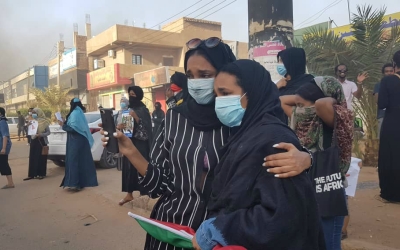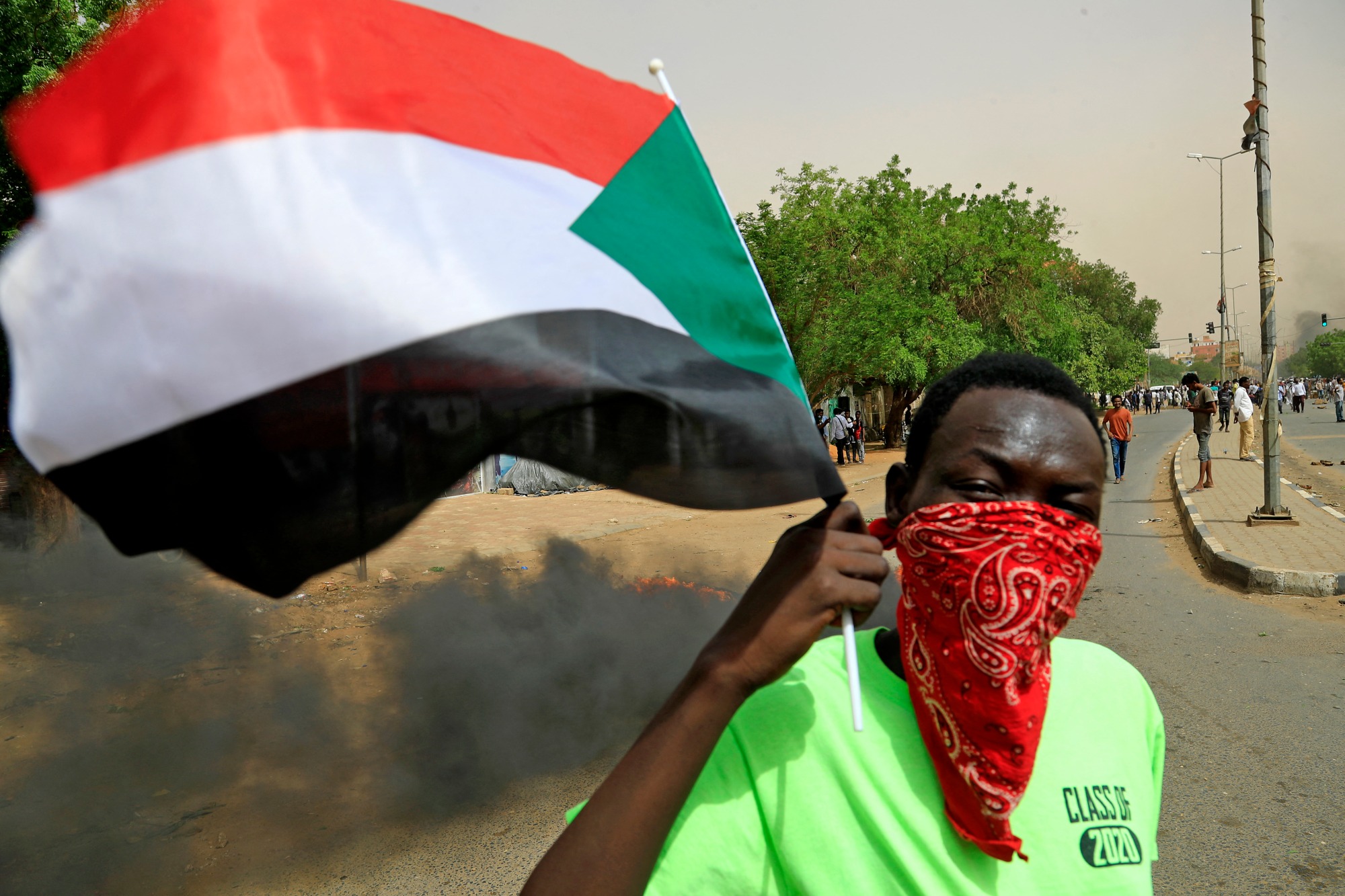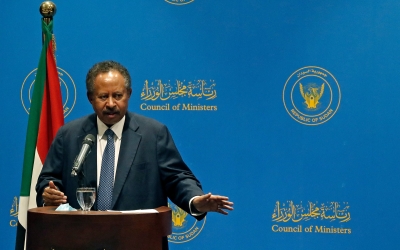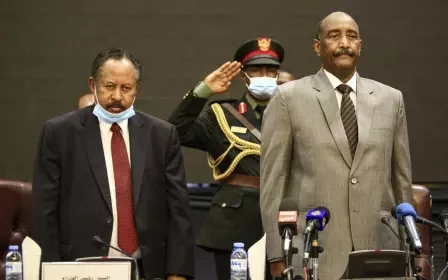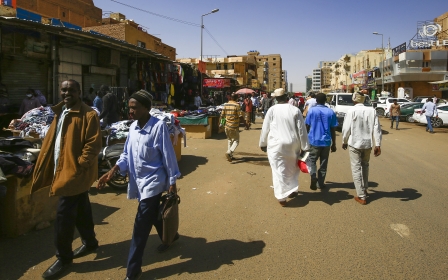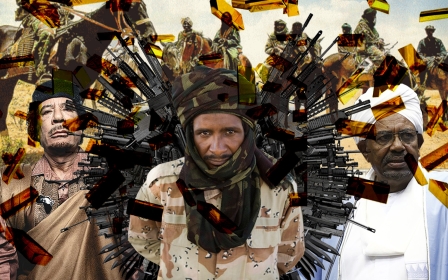Sudan protesters call for civilian rule amid disputes over army's role
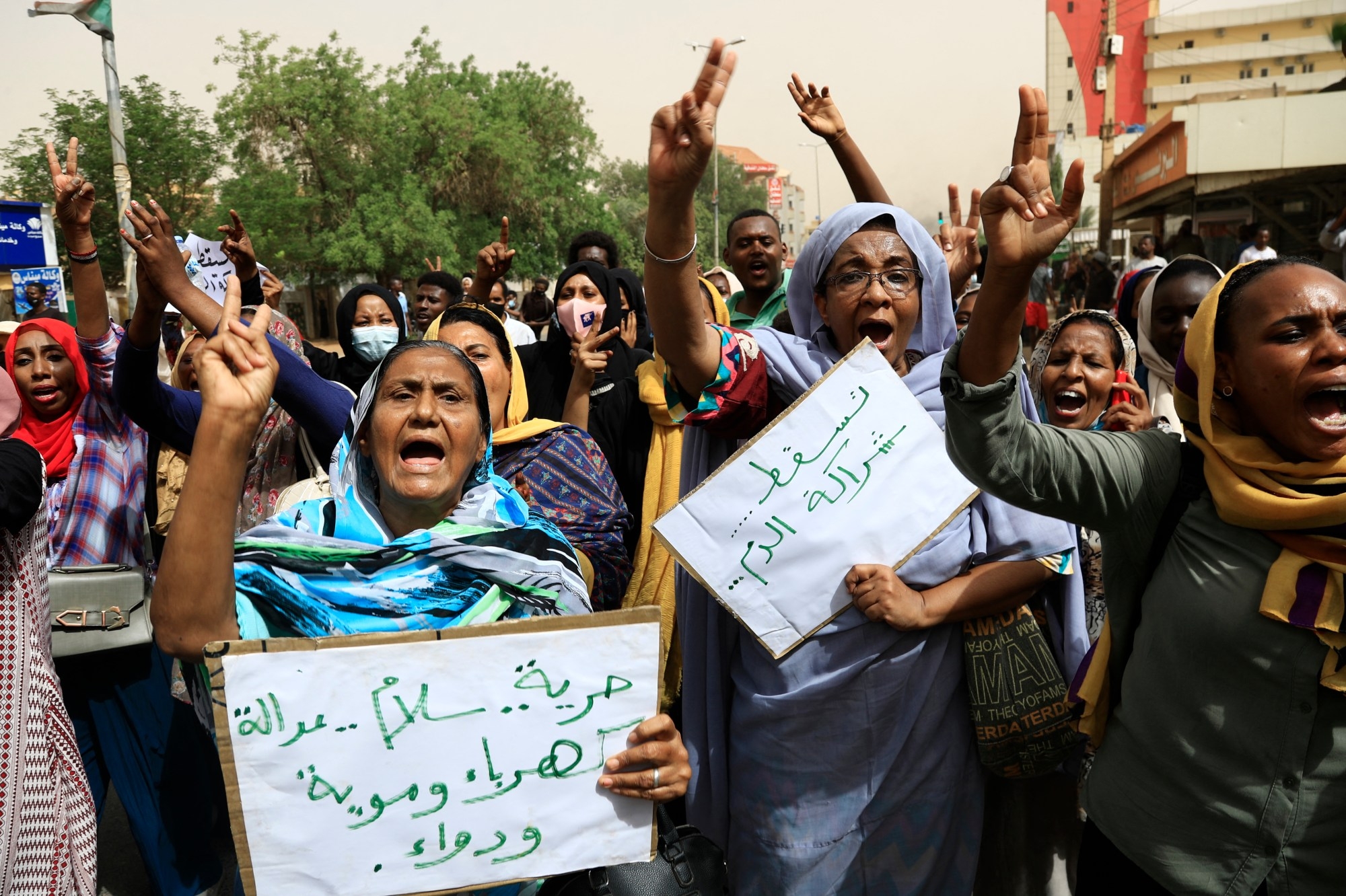
Thousands of Sudanese took to the streets of major cities on Wednesday to protest the continued role of the army in ruling the country and the effects of recent economic reforms mandated by the International Monetary Fund (IMF).
The demonstrators called for full civilian rule and for the scrapping of the constitutional declaration signed between civilians and the military in August 2019, in the wake of the overthrow of longtime ruler Omar al-Bashir.
'There is no democracy, no civilian rule, no justice... We are against the economic policies and lifting of subsidies, because our nation is suffering'
- Isra Abdul Azim, 25
The protesters were joined by Sudanese resistance committees and some political parties in their call for the removal of the army's role in government.
The protests follow last month's call by Prime Minister Abdalla Hamdok for a unified national army, amid tensions between the regular military and the powerful paramilitary Rapid Support Forces (RSF).
Demonstrators also voiced anger at recent IMF reforms that have seen the removal of fuel subsidies and a sharp exchange rate devaluation.
New MEE newsletter: Jerusalem Dispatch
Sign up to get the latest insights and analysis on Israel-Palestine, alongside Turkey Unpacked and other MEE newsletters
Critics of the government believe the reforms have exacerbated the country's economic crisis, with inflation approaching 400 percent and shortages affecting access to basic goods and services.
Wednesday's demonstrations also commemorated the second anniversary of the 30 June 2019 "Million march protests", which saw 10 people killed and which helped bring about negotiations which led to the formation of the country's ruling sovereign council.
Demonstrators also demanded justice for the 3 June 2019 Khartoum massacre, widely blamed on the RSF, in which more than 100 people died, and called for the formation of a transitional legislative assembly.
Authorities, who arrested nearly 100 demonstrators, accused members of Islamic political factions and Bashir supporters of attempting to turn Wednesday's protests violent.
'Freedoms under serious threat'
In Khartoum, thousands of protesters from different neighbourhoods of the capital carried signs with anti-government slogans, as police used tear gas to prevent them from reaching the presidential palace.
Protester Ahmed Mustafa, 23, strongly criticised the use of violence against demonstrators.
“The police used tear gas against us and the security organisms arrested some activists," he told MEE. "We feel there is no change, as the freedoms of assembly and expression are under serious threat.
“We will continue protesting until we see our demands become a reality and achieve all the demands of the revolution," Mustafa added.
Isra Abdul Azim, 25, concurred: "This government is just manoeuvring, there is no democracy, no civilian rule, no justice...We are against the economic policies and lifting of subsidies, because our nation is suffering.”
Nationwide protests
Protests in other cities across Sudan included Atbara, Dongola and Wadi Halfa in the north, Gadaref in the east, Nyala in Darfur and Kosti and El Obeid in the centre of the country.
In Atbara, demonstrator Badur Abdallah told MEE that widespread protests had taken place in the city, with confrontations between pro-democracy protesters and supporters of Islamic political factions.
Government officials accused supporters of the overthrown government of backing the protests in order to sow chaos and pave the way for a coup.
“We have reports that the associates of Bashir are preparing to convert the protests into violence," one government source, who requested anonymity, told MEE.
"We don't have any problem with the freedoms of assembly and expression, but we are against the old regime and we aim to protect the Sudanese revolution.”
A number of Islamic political factions - including the Sudanese Islamic Movement, the Reform Now Party (RNP) and the Forum of Justice and Peace (FJP) - had called on their supporters to join the protests in order to bring down Hamdok's government.
Salah Manaa, a member of the official committee set up to dismantle the remnants of Bashir’s political and economic networks, said on Wednesday that his committee had arrested 79 alleged agents of the banned National Congress Party (NCP), Bashir's former ruling party, in Khartoum and other states.
“The ruling NCP has been banned and dissolved by the order of the revolution, laws and regulation, so we wouldn’t allow them to practice this sabotage,” said Manaa.
However Mohamed Alfatih Youssef, a leading member of the Sudanese Professional Association (SPA), the civilian coalition that helped overthrow Bashir, said the protests were aimed at correcting the path of the revolution, as both the military and civilian components within the transitional government had abandoned it.
“These excuses of the presence of the old regime among the protesters don't scare us, because we already defeated Bashir’s regime in April 2019, but we are now pushing for civilian rule, justice and democratic transformation,” he said.
“We are also standing against the current economic policies of the IMF that forced the government to float the currency, lift subsidies and send prices soaring," Youssef added. "This will cause more fragility and political instability.”
Police strike
Another serious development on Wednesday was conflicting reports of a partial strike within the police force.
A police source told MEE under condition of anonymity that some police officers had not gone to work on Wednesday.
He said that the police were suffering from low salaries, despite sacrifices made to stabilise the country.
“The police have made a lot of sacrifices, but the government doesn’t care about us, so we didn’t go to work today to protest against this ignorance of our important role," the source said. "We want better salaries, better services, better working conditions, overtime, a good pension etc.”
However, another police official denied that there had been a strike, saying that entire police units had gone to work normally in Khartoum.
The source, who asked not to be named because he was not authorised to talk to the media, said that there had been some calls to strike among the police, but they had not been responded to.
“This is a movement from Bashir’s associates to worsen the situation," he said.
"The police have specific regulations and routes down which officers can very well express any complaints or problems, and that’s different from the options open to civilians.”
On Monday, dozens of police officers chanted slogans against the director of police and the minister of interior, as they addressed a public rally for the police in Khartoum.
Reintegration disputes
Sudan's media has meanwhile also focused on the growing dispute between the regular army and the RSF.
Reports said that disagreements had broken out over the attempted integration of the RSF - a paramilitary group accused of war crimes in Darfur under Bashir - into the regular army.
An army official told MEE that there had been mediation led by Hamdok and other Sudanese leaders to overcome the disputes between the two sides.
'Two regional camps are sharply intervening in Sudan and want to see a coup against the democratic transformation in the country'
- Alhaj Warag, analyst
“There were a series of meetings and mediations by Hamdok, some rebel leaders and others to avoid any possible trouble, and it succeeded at least to slow down the situation at this stage,” the source, who wished to remain anonymous, said.
MEE contacted several RSF sources for comment, but did not receive a response by the time of publication.
Sudanese political analyst Alhaj Warag believes that the current disputes and fragility of the country are due to serious regional interference in Sudan by parties who wish to bring about a totalitarian government.
“Two regional camps are sharply intervening in Sudan and want to see a coup against the democratic transformation in the country," said Warag during a symposium in Khartoum.
"The first camp of Saudi Arabia, the UAE and Egypt wants Sudan to be ruled by the military, and copy-paste the experience of their countries - while the second camp of Qatar, Turkey and Iran desires to bring the Muslim Brotherhood back in power in Sudan,” he said.
“However, we have to reject these two regional strategies, and build strong ties with the international powers that support democracy in our country.”
Middle East Eye delivers independent and unrivalled coverage and analysis of the Middle East, North Africa and beyond. To learn more about republishing this content and the associated fees, please fill out this form. More about MEE can be found here.


